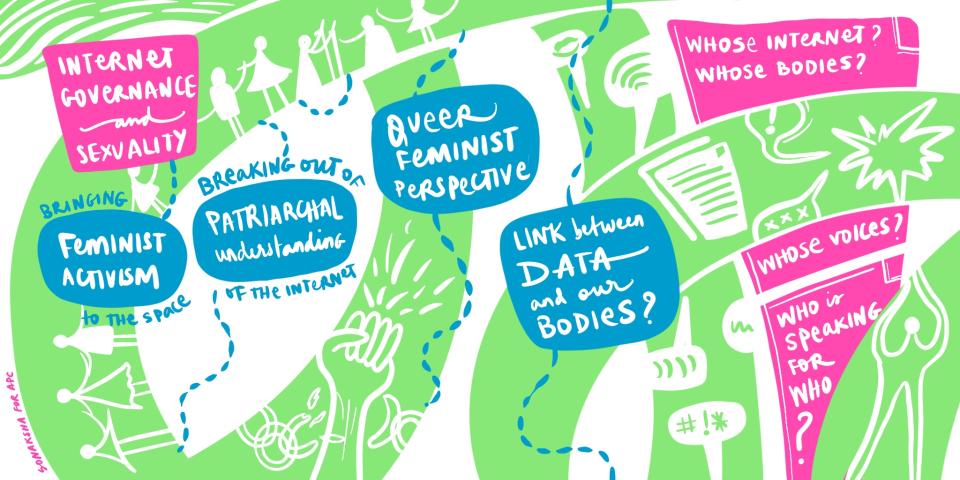
Internet governance and sexuality. Illustration by Sonaksha.
Throughout the sessions I have been sitting in at this year’s Internet Governance Forum (IGF), one thought has continuously come to mind: Where is the LGBTIAQ+ community in all of this?
I specifically followed the inclusion track of the IGF because what interests me is bringing more people to digital technology in ways that are safe and enabling for their existence. Specifically, the LGBTIAQ+ community. The internet creates the possibility for people across the world to find each other and to share their lived experiences, to gain a sense of belonging, and to build community with each other. Often being an LGBTIAQ+ person is an isolating experience, but the internet makes it possible to imagine a world where more people like you exist. And to find those people, even if they are spread out across the globe.
We cannot ignore LGBTIAQ+ people in our conversations on the internet, especially not in spaces like the IGF.
We need diverse representation of LGBTIAQ+ people at the IGF, because not every person or group or location has the same language for making sense of gender and sexual identity. The more voices we have in spaces, the more complex and richer our understandings of LGBTIAQ+ experiences will be. Our policies and approaches will be better tailored to the needs of this community when we adopt a deeper understanding of gender identity and sexual identity.
The more voices we have in spaces, the more complex and richer our understandings of LGBTIAQ+ experiences will be.
It may be incredibly difficult to have these conversations because of misunderstandings around what LGBTIAQ+ means, as well as the very real threats to the lives of LGBTIAQ+ people. Sometimes we do not have these conversations because this is a vulnerable group, and we need to navigate many obstacles to keep LGBTIAQ+ people safe. But this does not mean that we must shy away from having these conversations. It means, rather, that we must be led by LGBTIAQ+ people who can help navigate the terrain.
Organisations in taking up the task of including LGBTIAQ+ people in the conversation can lessen the risk of exposure to violence – for instance, if an organisation organises a panel, then an LGBTIAQ+ person is not at risk of being named as an organiser and having their identity exposed. Or organisations can reach out to LGBTIAQ+ people who can navigate spaces more safely and encourage and support them in organising IGF sessions.
Currently, conversations around LGBTIAQ+ issues and the internet are happening in the Q&As of gender inclusivity panels and presentations which primarily cater to the cisgender woman. This is not to say that cisgender women do not face extraordinary circumstances and difficulties gaining access or being included in the internet conversations but only that they are not the only ones. This, then, is another reason to not only actively include LGBTIAQ+ people in organising but to also adopt an intersectional approach to organising the IGF.
Different groups have different needs, we cannot assume that internet governance and related policies cater to all people if we have not brought them into the conversation to understand what their needs are. We need to be intentionally intersectional and inclusive in our thinking around the internet and digital technologies. We need to be having real conversations about race, disability, gender, class, and sexuality, to name but a few of the intersecting power axes.
It is important that these issues are a core focus, and not something that happens in informal gatherings. I find myself sitting in sessions and holding my breath, hoping that LGBTIAQ+ issues make an appearance unprompted by the audience. I heard people speaking of inclusive technology and inclusive approaches to technology but when they spoke of this, they were speaking of gender in the very binary sense of the word. Our understanding of gender needs to be far more nuanced, and inclusive of all gender identities and not only the binary. Where are the issues of transgender, non-binary, and gender diverse people in this conception of gender inclusivity?
I was hopeful when in one session when gender neutral language made an appearance. But gender neutral language was spoken of as being for men and women, and was not an intentional mention to make tech inclusive of non-binary folks. Given, gender neutral language will be inclusive by default, and that is wonderful, but how much more powerful would it be to opt for gender neutral language as a direct and intentional way of being inclusive of all genders?
In another session where someone spoke of titles and inclusive language, suggesting there be more than the typical Mr, Miss, Mrs, Ms. An audience participant wrote that they found titles unnecessary and that they would rather there be no titles or labels. This person may be cisgender and have the luxury of opting out of titles. For transgender, non-binary, and gender diverse people, titles are affirming. They validate their gender identity.
This is reason, again, for bringing LGBTIAQ+ people to the conversation to determine what their needs are and how to be more inclusive of their needs. When we have cisgender and heterosexual people determining what our needs are, we are inevitably going to be short-changed. We have voices. We have experiences. We have more than enough ideas on how to change things. Bring us into the conversation as real participants, and not mere symbols of inclusivity.
I do believe that the only way we will get these issues tabled is if LGBTIAQ+ people organise and advocate for the inclusion of these issues. It is not only the task of the IGF but of digital rights organisations and campaigns to add a nuanced understanding of gender and to bring sexuality into the conversation.
We have voices. We have experiences. We have more than enough ideas on how to change things. Bring us into the conversation as real participants, and not mere symbols of inclusivity.
We are at risk, always, when we attempt to include marginalised identities of generalising and presenting the issues in isolation. For instance, we may be at risk of creating a space to speak about LGBTIAQ+ issues and the internet as separate from other issues such as access, community networks, regulation, and so on. What we need is both: we need sessions that focus on LGBTIAQ+ people’s experiences and the internet, and sessions in which LGBTIAQ+ people are included in understandings on matters around regulations and digital rights, and so forth. The same applies to race, to class, to location, to disability, to name only a few.
The last few days have left me incredibly frustrated by the absence of LGBTIAQ+ issues on the table. Perhaps it is on the IGF or other participating organisations to have reached out to groups and asked for a session to be presented. It would have sent a clear message to LGBTIAQ+ people that the IGF is safe for them, and their issues and concerns are welcomed there.
But it is not only on the IGF. I could have submitted a session, but I did not because I hoped that someone else would do that, and that is not a good enough reason. We deserve more than one hypothetical session. We can have as many as we would like but we need to speak up and show up.
So, next IGF, I want to see a queer collective there. Anyone keen to join me? It is time we imagined a queer internet.
It is time we imagined a queer internet.
- 4266 views






Add new comment